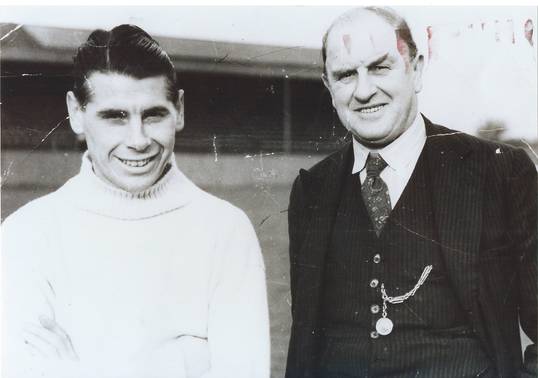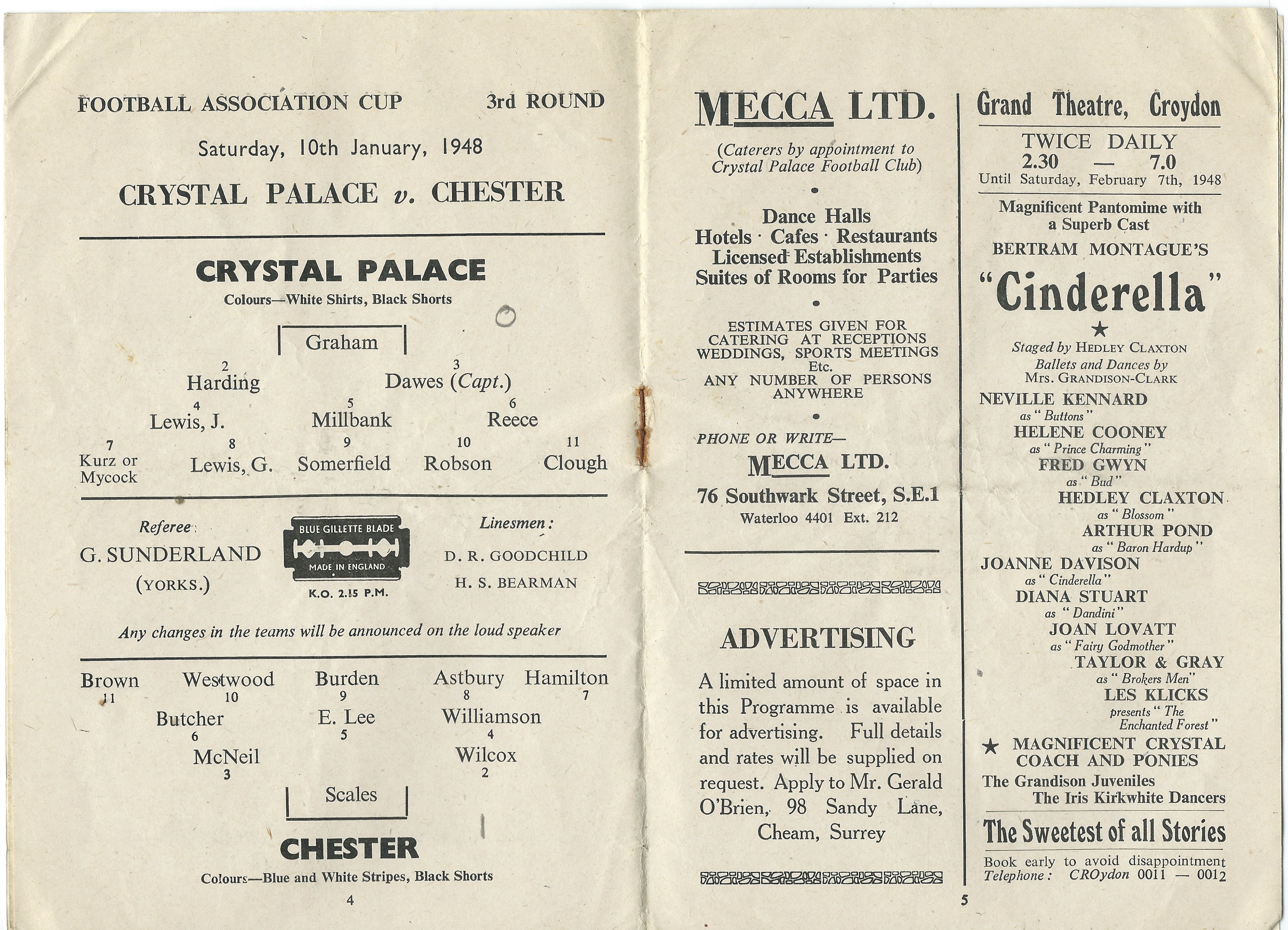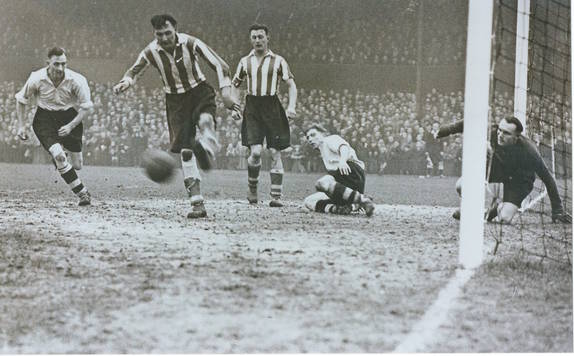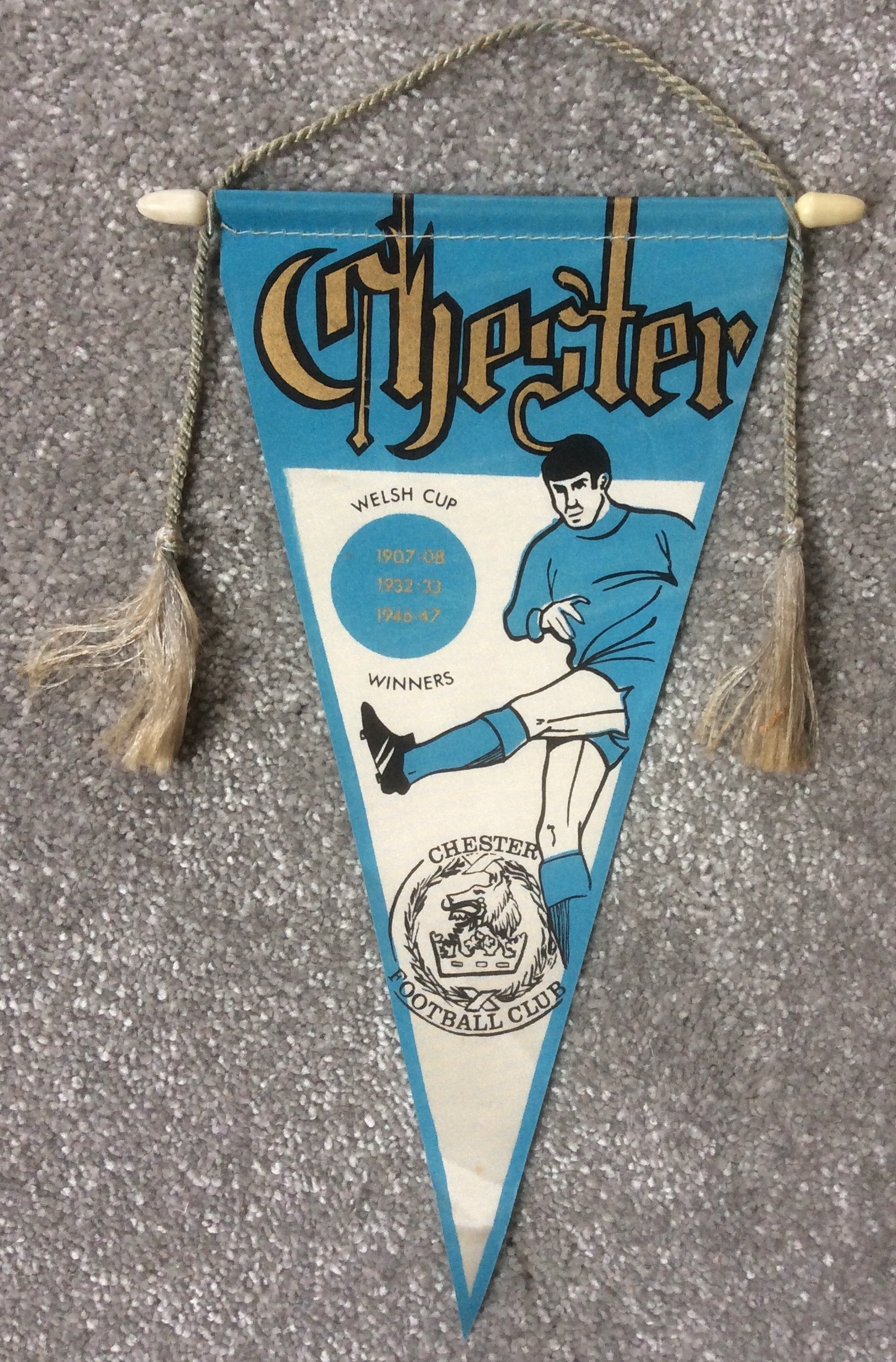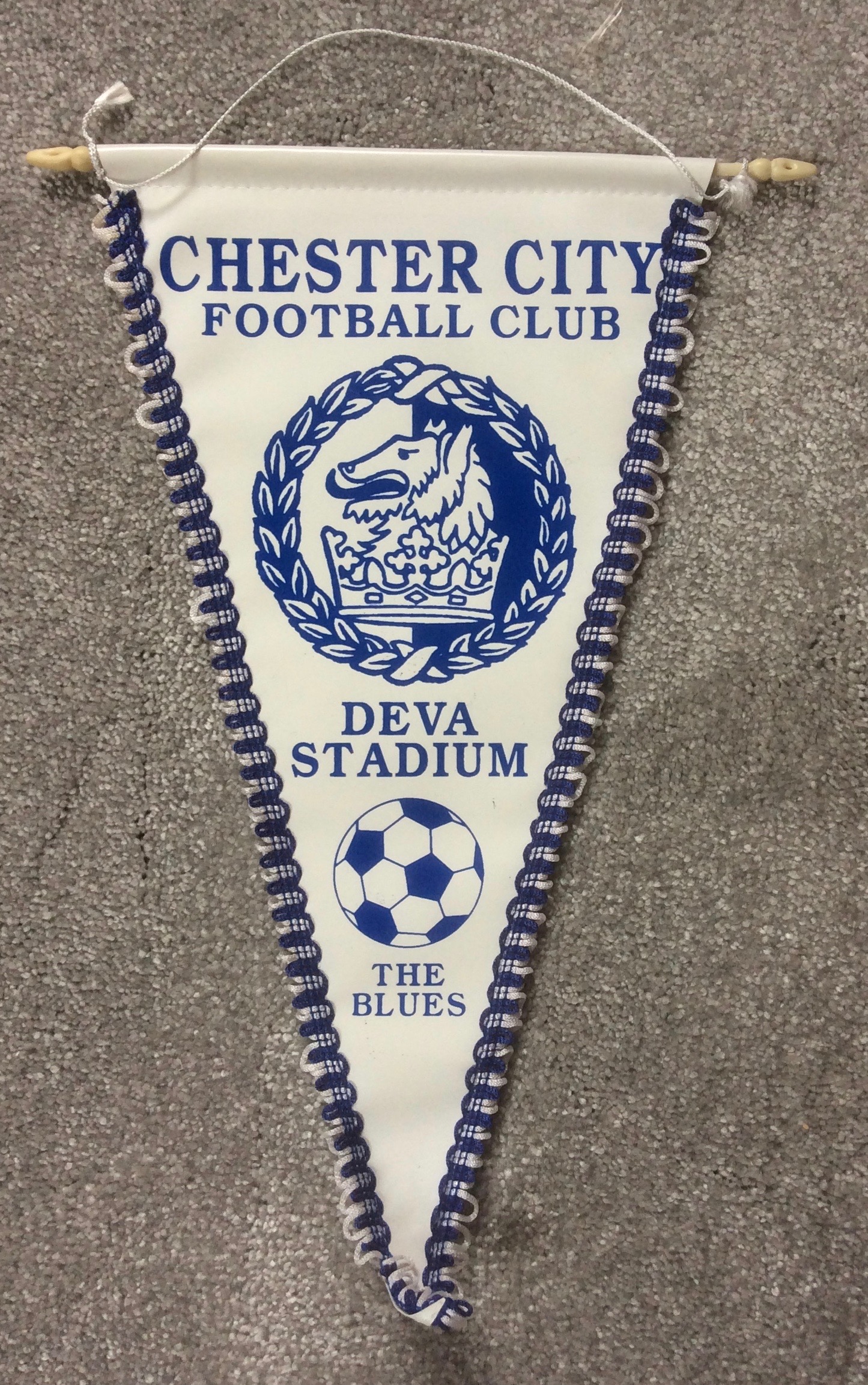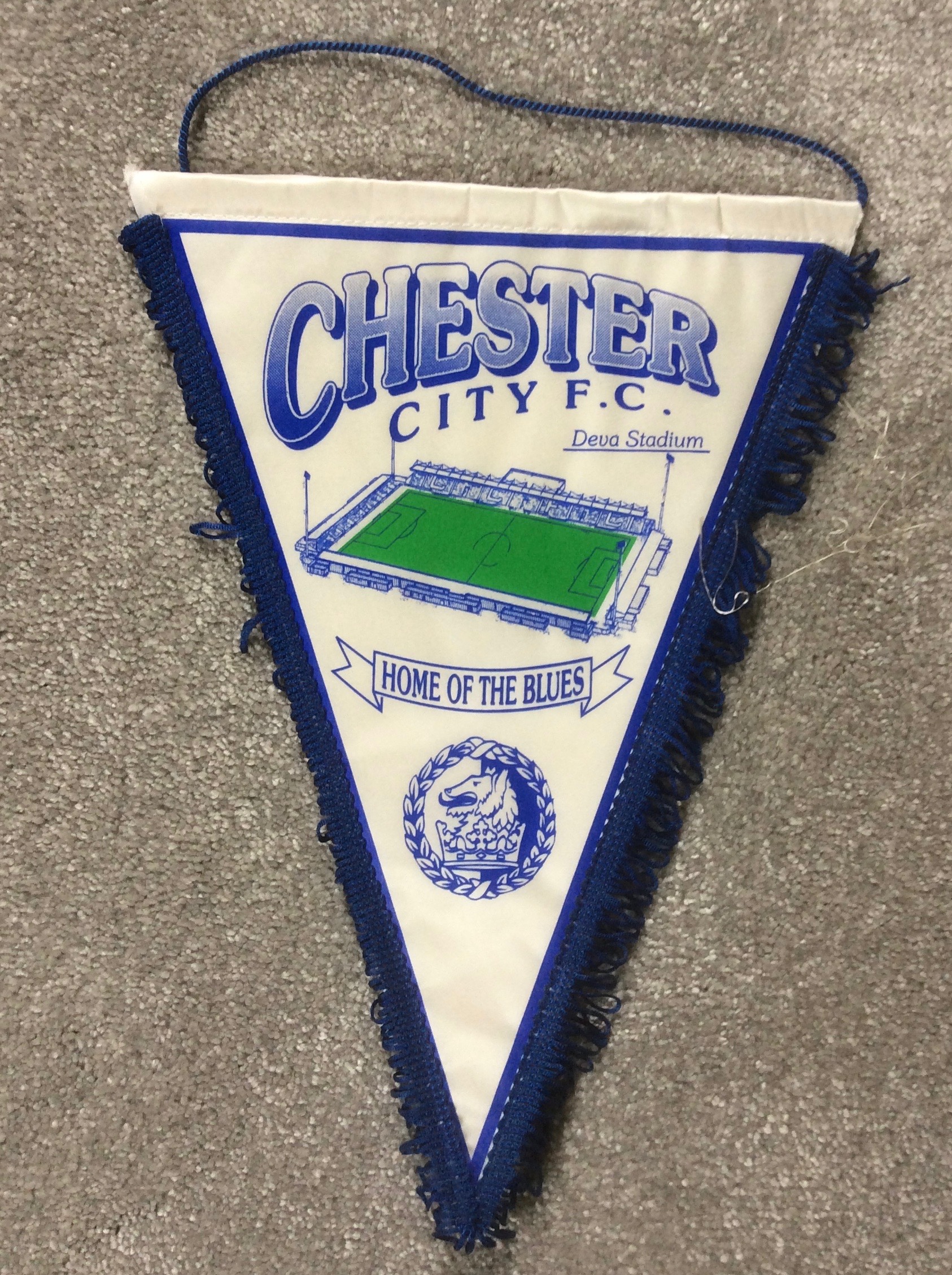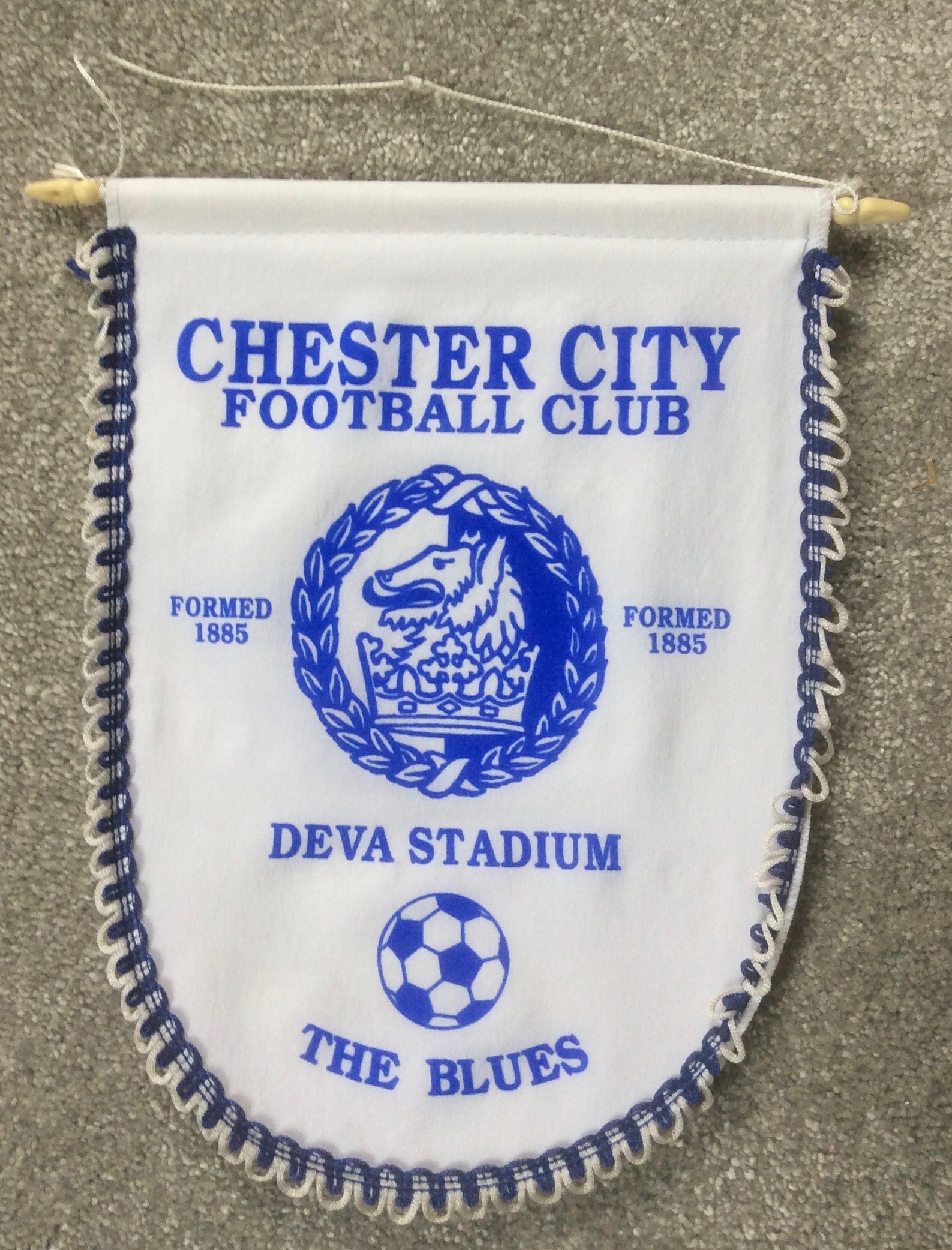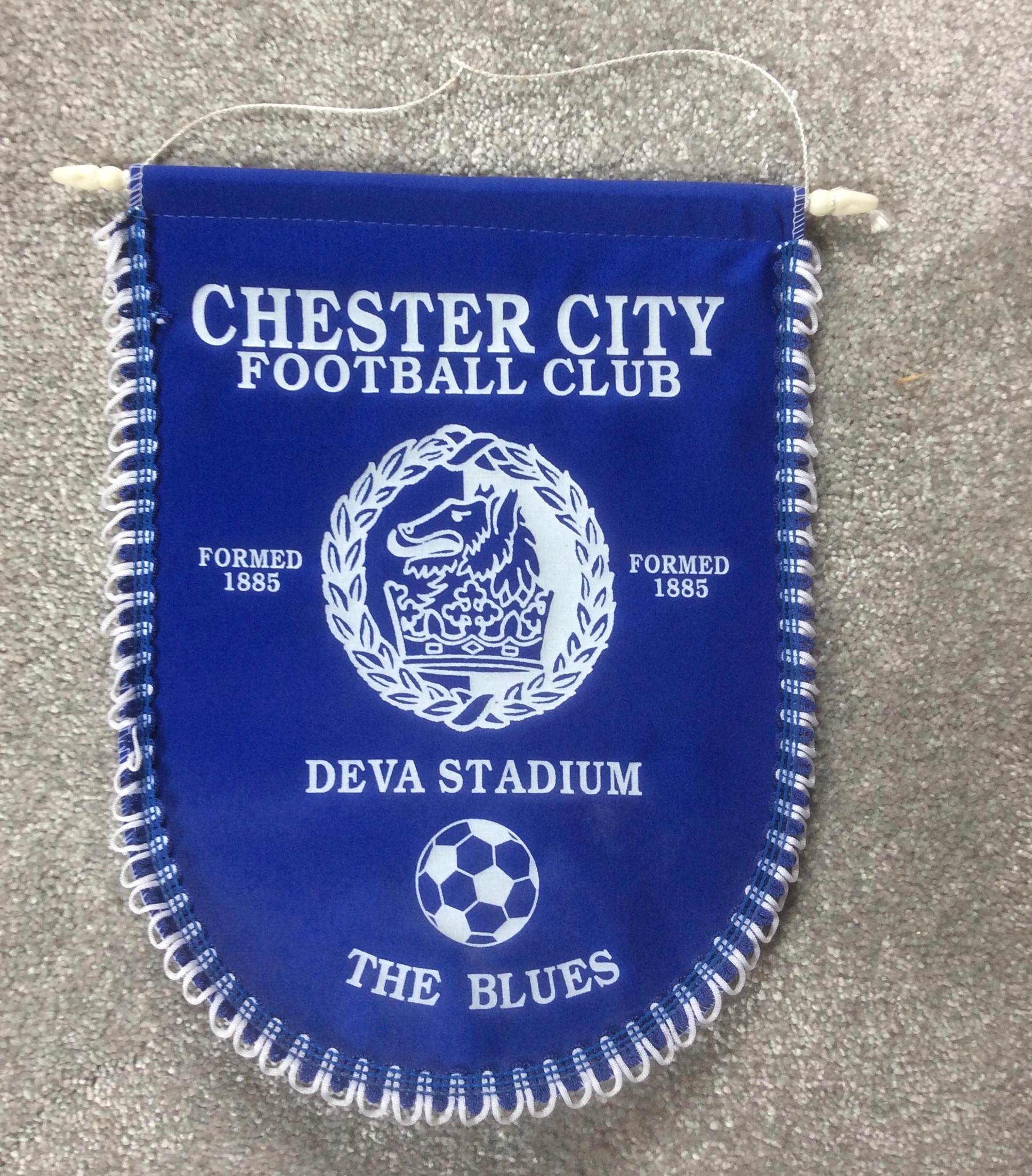1 – Pre-Match
Chester had hoped for a home tie in the 4th Round but instead they faced a formidable trip to First Division Blackpool.
The Seasiders, who had beaten Leeds United 4-0 in the previous round, were regarded as joint favourites to win the FA Cup and had the most dangerous right wing pairing in the country in the shape of Stanley Matthews and Stan Mortensen. The Lancashire team had persuaded Stoke to sell Matthews for £11,500 the previous summer and he had formed a lethal combination with the equally skilful Mortenson. It was clear that Chester’s left-sided defenders faced a tough proposition but much was made of the fact that Dave McNeil and Eric Lee had successfully subdued Matthews in the two FA Cup ties against Stoke 12 months earlier.
Blackpool themselves approached the tie with caution having build a reputation as “The Team That Cannot Win A Cup Tie”. Between the wars they had been beaten at home by the likes of Luton Town, Watford and Oldham Athletic while they had also lost at Southport and Southend United. In fact, since joining the league in 1931, Chester’s FA Cup record had been as good as their opponents with both sides playing in the 4th Round on four occasions.
Reflecting on their recent cup record, Blackpool manager Joe Smith was quoted in the Cheshire Observer as saying “Do you wonder that nobody is inclined to be too confident about this Chester match?….I am taking nothing for granted. As soon as I knew that Chester were coming to town I told the boys “This is not necessarily a walk over””
Manager Frank Brown, who had won a Central League championship medal with the Tangerines in 1919/20, commented “It is one of the hardest ties we could possibly have had, but whatever the outcome I am sure our team will give Blackpool a real fight.”

Image – Blackpool Former Players Association
There were a couple of familiar names in the Blackpool team. Centre forward Jimmy McIntosh had been a regular guest player for Chester during the war with his most notable performance coming in a 7-2 win over Wrexham in October 1942 when he scored a hat-trick. Meanwhile full-back Ron Suart had also made a couple of guest appearances at Sealand Road in 1944/45.
Chester warmed up for the game with a 1-1 draw at Darlington, in which new signing Ray Westwood scored his second goal in two league games, while Blackpool recorded a similar score at Wolves. The Seasiders approached the game as seriously as if they were playing a First Division side but had no special training other than a trip to the brine baths at Lytham and a planned game of golf.
There was no special training for the Chester players in Abergele either. With five part-time professionals unable to make the trip it was considered unviable, much to the disappointment of Abergele District Council who had made arrangements to host a dinner for the players. On the Thursday before the game most of the players went down to the Stadium for a final toning up and tactical talk and this was followed by an evening trip to the Regal Cinema. The following day they travelled up to Lytham St Annes where they stayed at a boarding house owned by a former employee of the Cheshire Observer.
Cup fever had overtaken Chester since the win at Crystal Palace and it was estimated that between 5,000 and 6,000 supporters would make the journey. Some supporters had taken an option on buses before the draw was made and within half an hour of knowing the opposition every coach had been booked. Both Crosville and the Corporation had been inundated with calls and it was reported that parties had resorted to booking buses from Birkenhead and Shropshire. The Chester Chronicle stated that the convoy of buses would leave Chester at 9am with 2,000 supporters also expected to travel by train. The paper also suggested that there was hardly a pub, factory or office in the city which hadn’t arranged a trip.
Bloomfield Road had a capacity of 30,000 so the match was not made all-ticket. Chester were allocated 1,400 stand tickets which failed to satisfy the more than 4,000 applications that had reached the club on the Wednesday before the game. Stand tickets had been priced at 6s, 4s 6d and 4s while the paddock was priced at 4s 6d and 3s and the ground at 1s 3d.
The game was scheduled to kick-off at 2:30 while a replay was pencilled in for the following Saturday and made all-ticket.
2 – The Match
Chester named an unchanged starting eleven from the team that had beaten Crystal Palace in the previous round. Winger Phil Turner, who had been out of the side for two months with torn ligaments, had resumed training but wasn’t considered fully match fit.
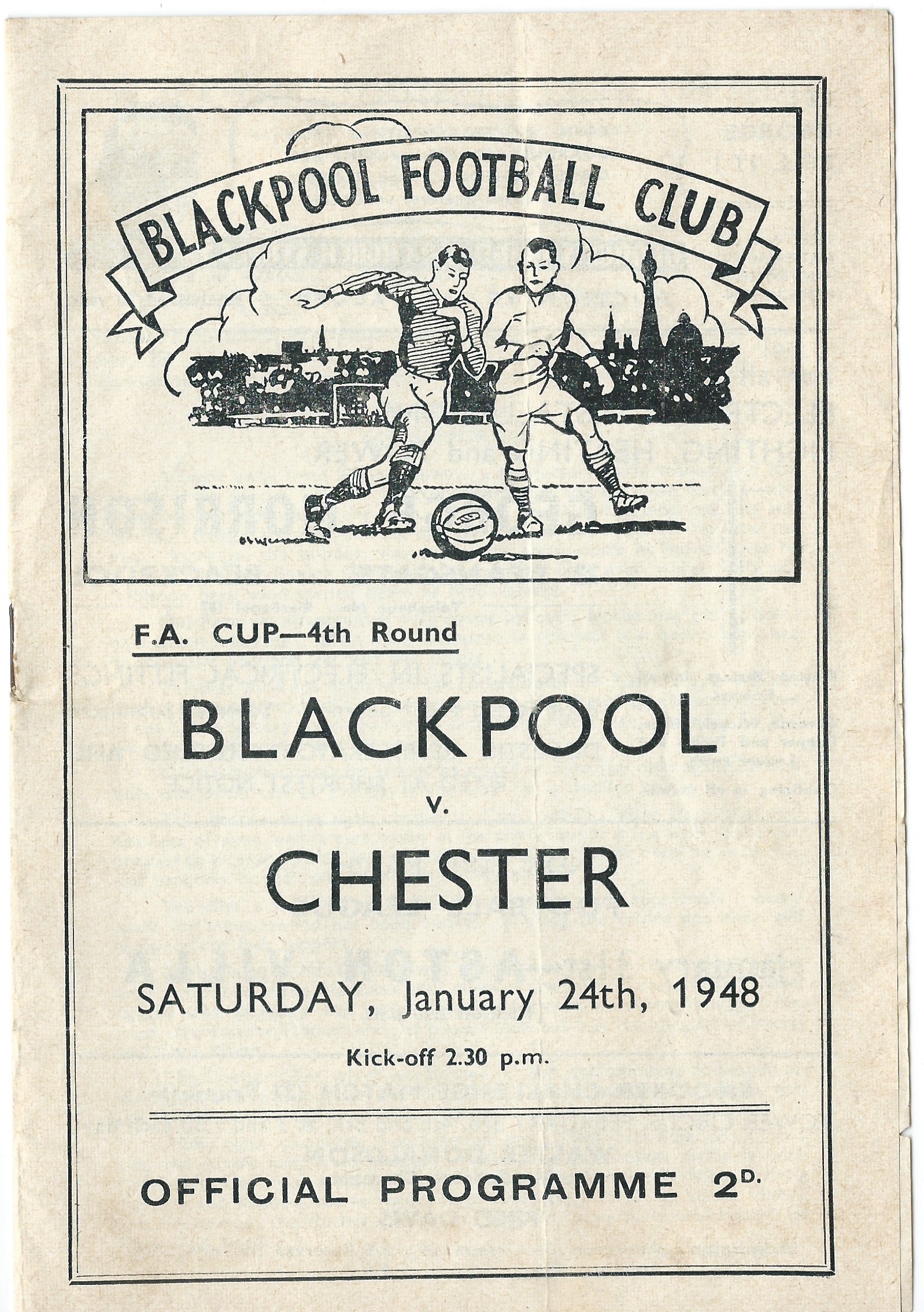

In the end an estimated 6,000 to 7,000 Chester fans made the trip but there was no happy ending as Blackpool ran out comfortable 4-0 winners. It proved to be an uncomfortable afternoon for goalkeeper George Scales, the hero of the Crystal Palace match, who was at fault for the two goals scored before half-time. Although Frank Brown’s side had plenty of possession they were unable to tame Stanley Matthews who reportedly had one of his best games since joining from Stoke.

Blackpool got off to a quick start but Chester were in no way overawed and fought back strongly. However, just when it looked like they had weathered the early storm, they fell behind to a freak goal. On eight minutes full-back Eddie Shimwell launched a mighty clearance from within his own half but Scales badly misjudged the bounce and the ball hit the frozen ground, and soared high over his head into the net. Freddie Willcox made a vain attempt to clear the ball but collided with the upright and had to receive attention.

It was a disastrous early blow and the mistake seemed to affect Scales’ confidence. When Mortensen hit a simple low shot on 25 minutes the goalkeeper was late in diving and let in a goal which he would normally have comfortably saved.
Trailing by two goals, after only 25 minutes, Chester faced an uphill task but they stuck to their guns and had as big a share of possession as their illustrious opponents. Both Joe Brown and George Williamson had good opportunities but despite a good spell of pressure City were unable to breech the Blackpool rearguard.
At the other end Willcox cleared off the line when Alec Munro shot for goal after good work by Matthews.
In the second half Blackpool took control of the game with Matthews a constant threat. The Chester defence struggled to cope with his wizardry and Dave McNeil, who had mastered the right-winger the previous season, was often outwitted. Fortunately the central defenders were able to deal with the stream of crosses otherwise the damage might have been much worse.
After Scales had partially redeemed himself with a brilliant save from Matthews Blackpool extended the lead on 69 minutes when Jimmy McIntosh fed Mortensen who ran through the Chester defence to fire past the keeper.
Chester’s best chance fell to Tommy Burden, who worked hard throughout, but his shot was blocked by Joe Robinson. The centre-forward was also unlucky to see a header from Bobby Hamilton’s cross go across the face of goal and out of play.
Six minutes from time the Seasiders wrapped the game up when Harry Johnston’s shot beat Scales off the post. Chester kept on trying to the end but they had been beaten by a better side although they received plenty of plaudits with the Blackpool Evening Gazette stating: “This Chester team deserves all the praise which could be given to it. Some of its football was of a class which Third Division teams are not supposed to play.”
Blackpool – Robinson, Shimwell, Suart, Johnston, Hayward, Kelly, Matthews, Mortensen, McIntosh, Dick, Munro
Scorers – Shimwell 8, Mortensen 25, 69, Johnston 84
Chester – Scales, Willcox, McNeil, Williamson, Lee, Butcher, Hamilton, Astbury, Burden, Westwood, Brown
Attendance – 26,414

3- Post-match
Amongst the congratulatory letters received by the club after the game was one from the Blackpool FC Girls’ Supporters Club who complemented the team on their display saying “I thought you put up a better fight here than many First division clubs have done.” they also expressed surprise that the club was only 17th in the Third Division North. In fact the FA Cup run was the highlight of a disappointing season and Chester’s final 20th position was the first time they had finished in the bottom half of the table since joining the Football League.
Opponents Blackpool also saved their best performances for the FA Cup and reached the final where they were beaten 4-2 by Manchester United in a thrilling match. This was the first time that Chester had been beaten by the eventual finalists since 1890/91 when they were hammered 7-0 by eventual winners Blackburn Rovers. In the league the Seasiders finished in what was considered a disappointing ninth position.
The Blackpool tie proved to be the final FA Cup match for six Chester players: George Scales, Tommy Burden, Bobby Hamilton, Joe Brown, Freddie Willcox and Ray Westwood.
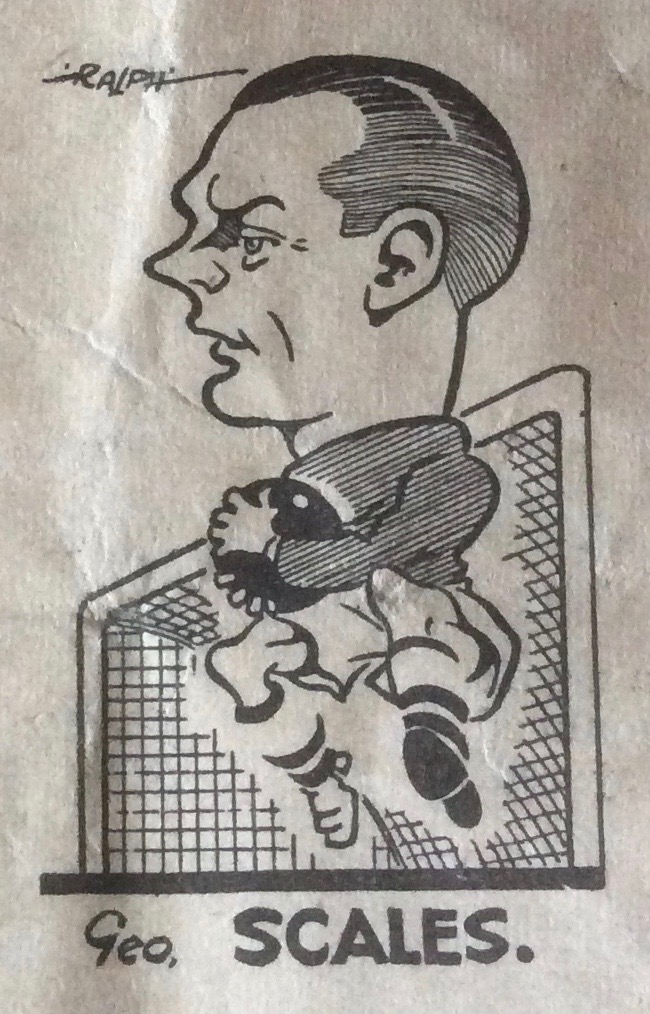
Scales continued to make regular appearances for Chester as he shared goalkeeping duties first with Jimmy MacLaren and then Ted Elliott. By the start of the 1949/50 campaign Elliott was firmly established as first choice keeper and in September Scales joined Rhyl, initially on loan, before making the move permanent. He won a Welsh Cup winner’s medal with the Welshman in 1952 to match the one he acquired with Chester in 1947. On both occasions Merthyr Tydfil were the opposition.
He left Rhyl in summer 1952 and became long-term landlord at the Pen-y-Bryn Hotel in Llanrwst. He died in 1993.
Tommy Burden had joined Chester in November 1945 from Wolves and was one of the success stories of the early post war years. As well as scoring the winning goals at Tranmere and Crystal Palace he managed an impressive 40 goals in 82 league games. His performances attracted the attention of Leeds United who were then managed by his former boss at Wolves, Major Frank Buckley, and he signed for the Yorkshire club in summer 1948. At Elland Road he was converted to left half, made 243 league appearances and was captain for his final four years in Yorkshire. A disagreement with manager Raich Carter saw him transferred to Bristol City for £3,000 in October 1954 where he remained a stalwart for the next eight years and recored another 231 league appearances. In May 1961 he briefly joined Glastonbury. Away from football he worked in the shoe trade and died in 2001.

Image – Chester Chronicle
Former Hearts junior Bobby Hamilton had also signed for Chester in November 1945 after being stationed in the city during the war. Although he was used on both the right and left flanks at Sealand Road there seems to be some question as to which was his best position . During the 1946/47 season he was mainly utilised on the left and was only switched to the right when Jackie Arthur was unavailable as appears to be the case for the FA Cup tie against Plymouth. The following year he again started on the left but injuries to Phil Turner saw him feature on the right wing where he played in the 1947/48 FA Cup run. However, a letter in the Chester Chronicle at the time suggests that Hamilton looked uncomfortable at outside left and was much better on the right.
Although Hamilton was one of the players who had attracted the interest of Sheffield Wednesday in 1947 he ended up signing for non-league Yeovil Town in 1948. He featured at outside right in the Yeovil team that famously beat First Division Sunderland’s “Bank of England” team in 1949 and continued to play for the Somerset side until 1952. He died in 1999.
Outside left Joe Brown joined Chester as an amateur from Port Sunlight and made 13 league appearances for the club before being released by Frank Brown at the end of the campaign and signing for Runcorn. The Bebington born winger remained at Canal Street for many years and faced Chester Reserves in the Cheshire County League as late as 1958. He died in 2004.
Full-back Freddie Willcox had joined the club from Everton and made 16 league appearances in the 1947/48 season. Recalling the Blackpool game in 2007 Freddie said that he received mild concussion after colliding with the post in attempting to prevent the first goal and couldn’t remember anything about the rest of the match.
Towards the end of the season he broke his tibia and fibia in a tackle, an injury that eventually brought a premature end to his career. In the 1948/49 season he featured for the Cheshire County League side and eventually signed for South Liverpool who he captained against Chester in a Welsh Cup tie that went to three games in 1949/50. After retiring from football he worked at Ford’s in Halewood and died in 2015.

Image – Rick Matthews
Former England international Ray Westwood was a major signing when he joined Chester from Bolton Wanderers for £2,400 on Boxing Day 1947. Although his class was evident, in the FA Cup ties against Crystal Palace and Blackpool, the 35 year old inside-forward struggled with injuries in his time at Sealand Road where he managed 13 goals in his 38 league appearances. At the time it was calculated that each appearance cost the club £70, an amount they could ill afford at a time when they were starting to struggle financially.
Before the start of the 1949/50 season he refused to accept terms and, after being made available for transfer, signed for Darwen. He continued playing for the Lancashire Combination side until 1951. A cousin of Manchester United and England international Duncan Edwards, he died in 1981 at the age of 69.
Copyright © http://www.chesterfootballhistory.com All Rights Reserved




